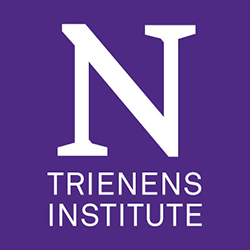PEPH Hybrid Event: Karen I. Winey, UPenn

When:
Monday, April 15, 2024
1:00 PM - 2:00 PM CT
Where: Ford Motor Company Engineering Design Center, The Hive, 2133 Sheridan Road, Evanston, IL 60208 map it
Audience: Faculty/Staff - Student - Public - Post Docs/Docs - Graduate Students
Contact:
Mike McMahon
Group: Trienens Institute
Category: Lectures & Meetings, Environment & Sustainability
Description:
The Program on Plastics, Ecosystems, and Public Health (PEPH) will host Karen I. Winey, Harold Pender Professor of Engineering and Applied Science, University of Pennsylvania for a hybrid (in-person and virtual) event. Registration required, lunch provided.
Registration: In-person attendance / Virtual attendance
Who: Karen I. Winey, Harold Pender Professor of Engineering and Applied Science at the University of Pennsylvania with appointments in both Materials Science and Engineering and Chemical and Biomolecular Engineering
What: "Polymer-to-Polymer Chemical Transformations to Produce Specialty Plastics from Waste Polyolefins"
When: Monday, April 15 | 1:00-2:00pm
Where: Ford Design Center | The Hive | Room 2350
Abstract:
Polyolefins include polyethylenes and polypropylenes and are the most ubiquitous polymers produced today. To keep these fully saturated polymers out of the landfill, I am leading a collaborative project focusing on developing synthetic chemical routes to transform polyolefins into higher-value specialty polyolefins without substantial change in molecular weight. Current efforts are focused dehydrogenating polyolefins and then functionalizing the C=C bonds to incorporate associating groups that enhance mechanical, adhesive, and transport properties. Using a variety of chemical routes, we are targeting functionalized polyolefins that mimic commercially important materials including poly(ethylene-co-vinyl alcohol) and poly(ethylene-co-acrylic acid) copolymers, as well as new polymers including poly(ethylene-co-diols). We also explore how the polymer architecture, functional group, and the level of functionalization control the glass transition temperature, melting temperature, percent crystallinity, surface properties, and adhesion. Interestingly, electrochemical impedance spectroscopy studies reveal multiple subsegmental relaxations in certain polymers and directly measure the intrinsic relaxation time and activation energy of the sticker association/dissociation process. These studies use a model substrate, polycyclooctene, to demonstrate the viability of combining dehydrogenation and functionalization of polyethylene’s to produce specialty plastics from waste polyolefins.
Speaker Bio:
Karen I. Winey is the Harold Pender Professor of Engineering and Applied Science at the University of Pennsylvania with a 50:50 appointment between Chemical and Biomolecular Engineering and Materials Science and Engineering. Karen’s current research interests focus on (1) ion and proton conduction in polymer for a variety of electrochemical applications including batteries, fuel cells, electrolyzers, (2) polymer-to-polymer chemical upcycling of polyolefins to functionalized polyolefins, and (3) nanoparticle dynamics in polymer melts and polymer electrolyte brushes. Her approach typically includes model materials, careful processing, and thorough characterization of morphology and properties, and often directly couples to theory and simulations. Karen has also held a variety of service and leadership positions and is currently serving on the APS Council and the Scientific Advisory Board for the Max Planck Institute of Polymer Research. In addition to earlier recognitions, Karen was recently awarded the 2020 Braskem Award by AIChE, fellowship in the American Association for the Advancement of Science in 2022, and the 2023 ACS Award in Polymer Chemistry.
This conversation is part of the seminar series hosted by the Program on Plastics, Ecosystems, and Public Health at the Paula M. Trienens Institute for Sustainability and Energy. Co-hosted by the Northwestern Departments of Chemistry and Chemical Engineering.
Questions? Contact mike.mcmahon@northwestern.edu